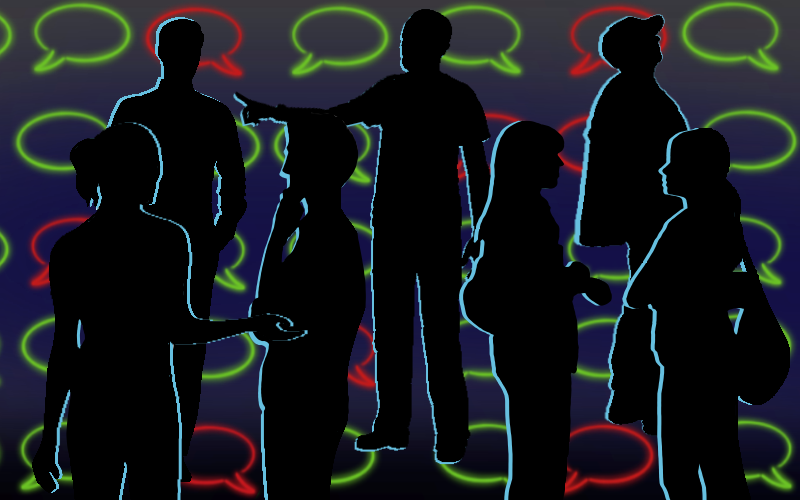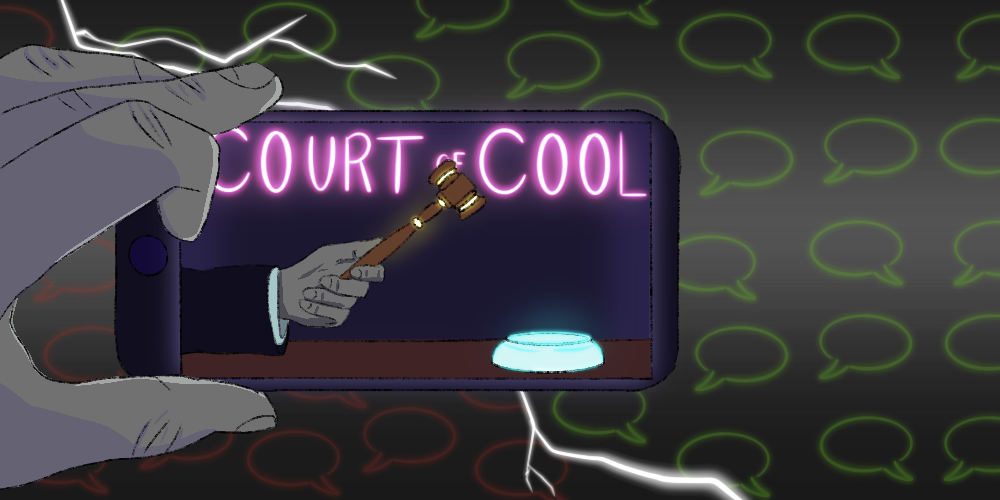Teenagers can be the cruelest of any age group: keen to apply their maturing intellects to matters of ridicule, yet with a sense of identity so fragile that insecurity dictates their thoughts. The result is a uniquely hostile interpersonal environment where any opportunity for mockery is relished with a nascent hunger; simultaneously, such cruelty is never more damaging to one’s self-esteem than at such a vulnerable and formative stage. How can matters of taste be discussed in such an environment, where to risk a “wrong” opinion is to jeopardize one’s social status? An impenetrable armor presents itself in the form of irony. When there is uncertainty over how you will be perceived, irony lets you say two things at once, to occupy the space between two opposing preferences, safely insured against all scenarios. An anxious teen can present an opinion on a person or piece or culture — risk-free — by simply shielding their preferences behind irony’s translucent cloak. Irony can be invoked not just with regard to statements but to behaviors: claiming to enjoy something ironically or semi-ironically similarly precludes any critical judgment at the hands of your peers. At times, the ironic imperative is so strong that one’s true preferences can be lost beneath these layers of armor.
Whilst such tendencies may linger and remain in use throughout adulthood, they tend to diminish as we grow out of our teenage years and settle more securely into our personalities. Yet over the past 30 years, irony seems to have become a defining feature of Western culture. No longer simply a defense mechanism employed by adolescents, it has become an entire way of life for a generation of adults. This primarily manifests itself in a cultural retreat into the knowingly uncool: either through the tongue-in-cheek recycling of the recently unironic (see: the re-adoption of ’90s aesthetics) or through the cooptation of the entirely unfashionable, as seen in the normcore movement. By occupying a cultural space that is deliberately uncool, ironic culture pre-empts criticism. This phenomenon is particularly acute online, where irony has become so heavily integrated into discourse as to deprive it of meaningful intent. Memes are often jokes about jokes about jokes that no one was sure were funny in the first place, but which designate an ironic community who “get” the nested references. This community can enjoy their ingroup status whilst being protected from difficult decisions of taste (Is this good? Is this actually funny?) by this baroque ironic artifice.
Cultural defensiveness does not solely manifest itself in terms of irony. In a further parallel of the teenage experience, ironic sentiments are often accompanied by default to criticism, instinctive reactionism, and the predominance of the anti-. Topics that receive the most attention online often hinge upon straw men that are easy to criticize. Witness how many trending topics are simply a catalog of backlash against some marginal point of view expressed by one troll or cartoonish moron. Conservative hashtags will be trending not because conservatives are using them, but because they are embedded within thousands of ripostes by progressives eager to give their own hot take on this phantom antagonism. Such processes are an example of how criticism remains the safest, most dominant mode of online discourse. Straw men attract so much negative attention because they are comfortable to engage with: there is no grey area, no space for difficult debate.
Thus a rationale begins to emerge which ensures safety at all times. The main options are as follows: ensure that something is such a caricature of monstrosity that it can be securely criticized, or employ irony as a hedge against being wrong. Another safe option is to avoid stating preferences altogether when you are on uncertain discursive ground. The final option is what I call exaggerated earnestness. Even the ironic teenager may allow themselves to get unironically excited about certain films, music, books, or video games. This can only be achieved in situations of universal consensus that something is genuinely good among the cool community. This consensus is fragile, and in order to be maintained, demands enthusiasm from all members of the community. Therefore the safest way to maintain this status quo is not only to extol the virtues of the thing but to exaggerate them, to avoid slipping towards the single criticism that could unravel the consensus. Even amongst things that are good but not perfect, irony encroaches into sincere preferences so aggressively as to drive them to the attitudinal margins. As a result, genuine opinions become increasingly exaggerated and rare, dichotomized against the absolute uncoolness of the straw men, with the two separated by a no-man’s-land of irony and aversion. In this way, growing levels of irony can be seen as both a cause and a function of attitudinal polarisation.

Why have we become like this? What happened to make us so scared to express ourselves sincerely? One explanation is technological: As social media functions as an archive of any thought you’ve cared to make public, past opinions can be constantly investigated and re-examined over time as norms evolve, increasing the likelihood of finding a discrepancy. In the past, the wrongness of an outdated or harmful thought from some years prior was regretted or forgotten; now it can represent a significant threat to one’s reputation. We have seen countless examples of celebrities apologizing for offensive posts that have been dredged up from some years prior. I do not wish to excuse such posts, only to note that an observer of such dynamics, when considering expressing an opinion on a sensitive or uncertain issue, may opt to ironize themselves.
Aside from this, has something deeper altered how likely we perceive ourselves to be wrong? In a 2012 article on the subject of irony, Christy Wampole offers two possible explanations. The first is the perception that “this generation has little to offer in terms of culture, that everything has already been done.” If a key component of coolness is some sort of subversion of societal norms, then cultural trends since WWII have addressed some relatively low-hanging fruit: we’ve done sex being cool, drugs being cool, technology being cool, and nihilism being cool. This can create the seductive impression that there is nowhere else to turn. However, the reality is that due to the fragmentation of our cultural experience there is no longer an obvious or singular direction that which we can collectively embrace. With the rise of the internet, our experience of culture is not just fragmented but atomized, chopped up into bite-sized pieces made suitable to our dwindling attention spans. In such an environment, cohesive and homogenous cultural norms have become more difficult to establish, as a plurality of different cultures and modes of experiencing them interact, merging and mutating with unprecedented intensity and frequency. By contrast, cultural trends from previous decades seem monolithic. In this way, the feeling of “running out of road” is actually nostalgia for an era where our cultural experience was easier to categorize and navigate.
Wampole’s second explanation for the rise of irony is the notion that “serious commitment to any belief will eventually be subsumed by an opposing belief”. On one level, this is simply a teenage lack of confidence in one’s opinions, insecurity of online life that echoes that of the playground. On social media we are back in the world of brutal status hierarchies, performative displays of social capital, and bullying. The same fears are there: the fears of being unpopular, uncool, of losing social status. On another level, however, this is also a result of irony rather than a cause: in a world where every preference is made mutable by ironic intent, the landscape of opinions becomes liquid and unnavigable. When anything can become a joke, there are no firm footholds, and the only way to survive is to become liquid yourself.
It may be the case that the perceived likelihood of being wrong is also connected to broader socio-political developments. In the globalized world, a multitude of perspectives complicates previously black-and-white issues. The rapid movement of people and finance across borders has led to levels of economic and cultural change that have expanded the political space beyond the two-dimensional left vs right distinction that defined ideologies for much of the 20th Century. Traditional understandings of gender, sexuality, technology, employment, and communication have been overhauled and continue to develop. Growing awareness of the deleterious effects of unfettered industrial capitalism has given rise to greater efforts to practice ethical consumption, efforts always seemingly doomed by the latest revelation about corporate practices or collateral effects of over-production. The specter of climate change looms over us, urgent and systemic, and so deeply embedded within our economies as to make their separation seem an impossible task. In short: there have certainly been times in history where we have been more insecure, but never has our insecurity been so complex. In the face of such unprecedented complexity, is it surprising that we are less secure in our opinions? There are so many new uncertainties, and their corollary: so many new ways to be wrong. No wonder we are terrified, looking for psychological defenses.
How do we expand the realm of earnestness and stop the encroachment of irony? At the political level, we can engage in the kind of unironic progressive activism suggested in Wampole’s 2016 follow-up. At the individual level, Wampole’s other solution — that we should strive to “live unironically” by monitoring how we deploy irony through our persona, style, and jokes — is also vital. In matters of taste, we must learn that there are worse fates than being uncool, and that earnestness is in fact the coolest of traits. Beyond this, we must cultivate a public space where irony is not required. On one hand, this requires doing our research to understand the ways in which the world is changing, enabling us to participate in sincere discussion without fear. On the other, we have to allow more space and empathy for discrepancies, without excusing them. Explaining why we disagree with a position, rather than simply condemning it out of hand. Writing fuller explanations that explain our position on complex issues and attempting to understand why opposing positions may have been taken. Not being afraid to ask for an explanation, or to give one without judgment. Greeting disagreements not with mockery but with engagement. Being honest when we are unsure about something. Where appropriate, calling out irony where it is lazy or evasive. To identify what exactly has been hedged, what half-commitments have been made, and to question these. We have relied on irony for too long — at best this has made us boring and unoriginal; at worst apathetic and polarised. It is time for us to put down our most trusted shield and embrace vulnerability as a post-teenage society.•




